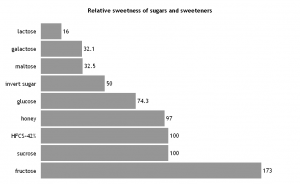Fructose – The Enemy Or The Innocent Victim
 New research studying over 40 published research reports highlights the number of calories consumed by study participants shows that when calories are restricted, even if these calories come from fructose, that the participants do not gain weight. This is in stark contrast to studies that implicated fructose as a major culprit in the battle of the bulge.
New research studying over 40 published research reports highlights the number of calories consumed by study participants shows that when calories are restricted, even if these calories come from fructose, that the participants do not gain weight. This is in stark contrast to studies that implicated fructose as a major culprit in the battle of the bulge.
When the calories from fructose are increased, however, those that consumed the extra calories did gain weight, the report says. “Fructose may not be to blame for obesity,” says lead author Dr. John Sievenpiper. “It may just be calories from any food source. Overconsumption is the issue.”
Advocates for limited fructose consumption often cite the burden that fructose puts on the liver, as nearly one third is processed like alcohol in the body. Dr. Sievenpiper says since there is limited research, and that the research that is available is of inferior quality, there is a definite need for further study.
Source: sciencedaily.com
 Eating Disorder Self Test. Take the EAT-26 self test to see if you might have eating disorder symptoms that might require professional evaluation. All answers are confidential.
Eating Disorder Self Test. Take the EAT-26 self test to see if you might have eating disorder symptoms that might require professional evaluation. All answers are confidential.